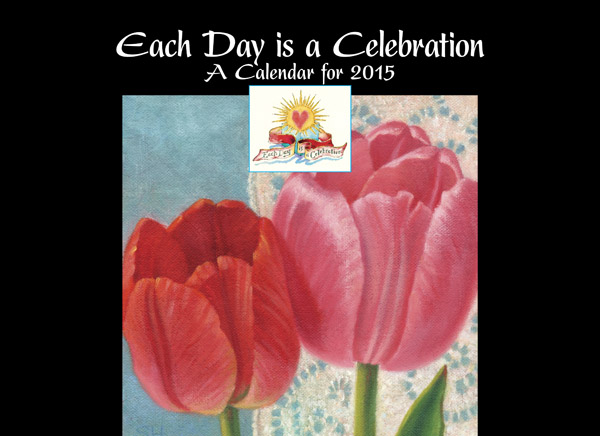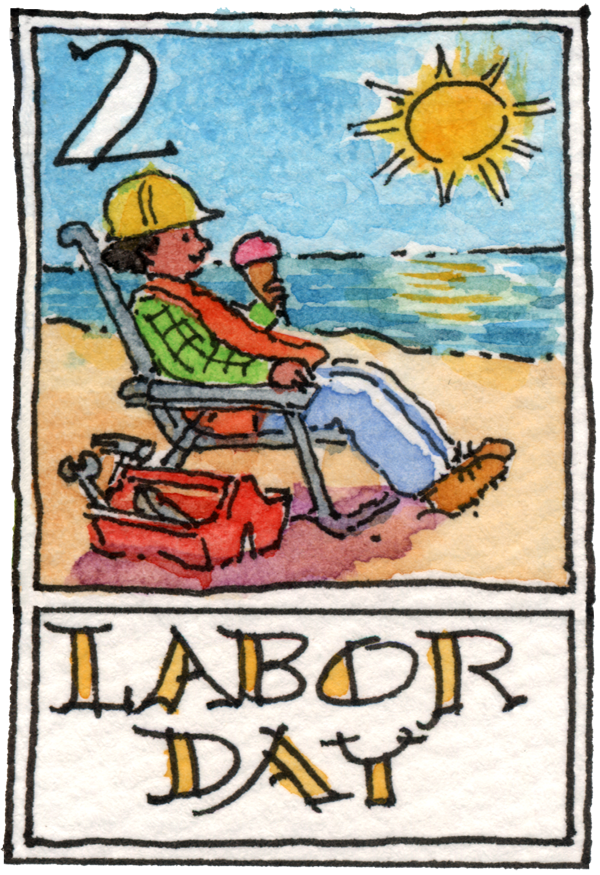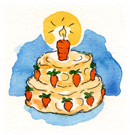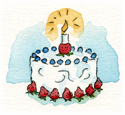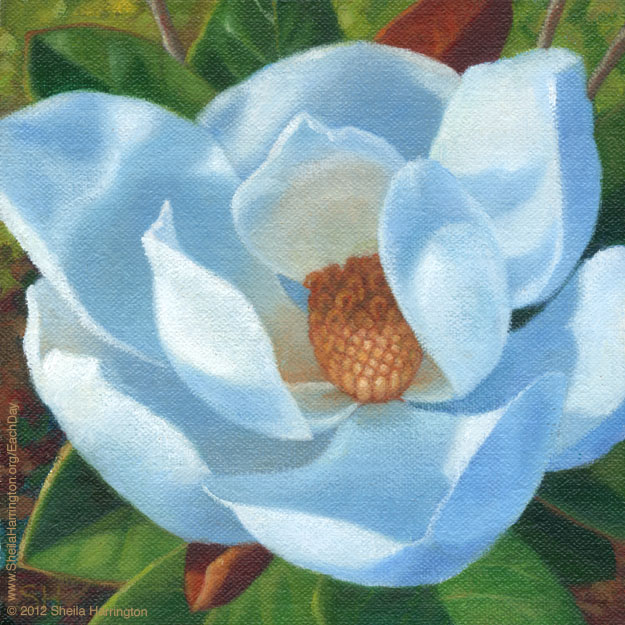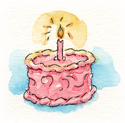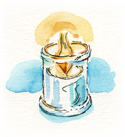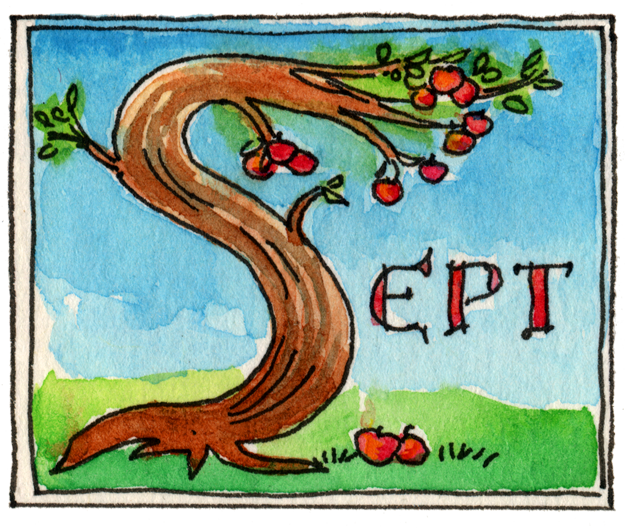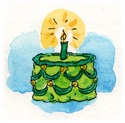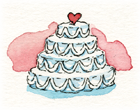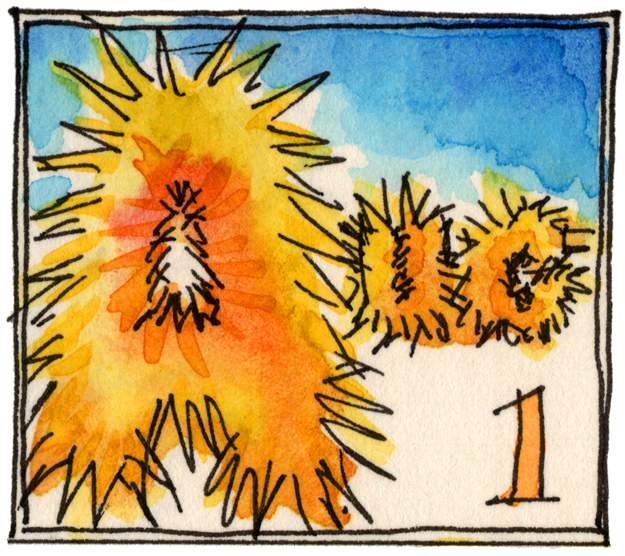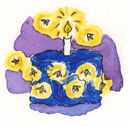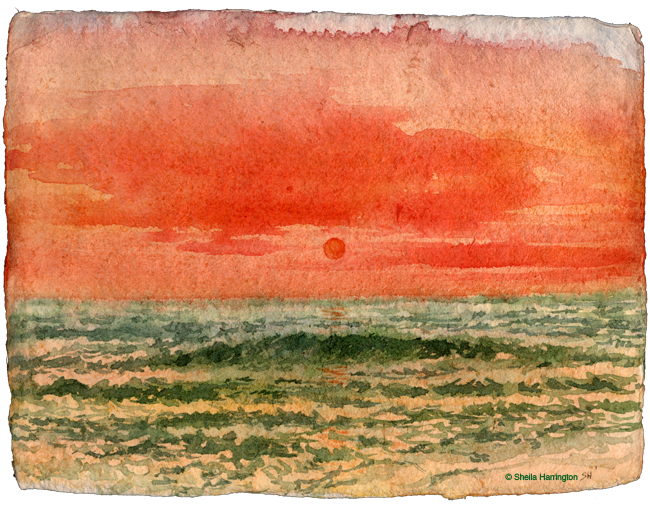Here is a new calendar for 2015, each month featuring one of my seasonal still-lifes. I’m taking orders, but unfortunately they have to be received by Sept. 9th for me to place the order. Not much time, I’m afraid! Next year there will be more advance notice. Please contact me if you have any questions. Your calendar will reach you before the end of September. Shipping is 2-day Priority Mail, domestic US. (But if you are in my area you can get it from me directly without shipping!)
Tag: Summer
Happy Labor(less) Day
Summer in the South
Today is the birthday of writer Paul Laurence Dunbar (1872–1906), a once-upon-a-time resident of Washington, DC, and the child of former slaves. His father had escaped through the Underground Railroad and fled to Canada, returning to fight in a Massachusetts regiment upon the outbreak of the Civil War; his mother, freed by emancipation and on the verge of emigrating to Liberia, instead decided to remain in the U.S. when the war ended. They met and married post-war in Dayton, Ohio, where Paul was born.
Dayton was a 19th century rural-to-urban destination for southern African-Americans, who quickly established churches, schools, newspapers, and small businesses. Paul’s mother, sure that he showed promise, enrolled herself in night classes (during the day she worked as a cook and laundress) in order to be able to teach her son to read. She encouraged his early interest in writing, and he produced his first poems at age six and began reciting them publicly at nine. In 1887, Ohio abolished racial segregation in the school system (although extracurricular activities like plays and dances remained segregated), and Paul attended local schools as the only African-American student, serving as high school class president and writer and editor for the school paper.
Despite his excellent school record and his having had several pieces of work published in local newspapers, Dunbar found it impossible as an African-American to find either employment in journalism or funds for college. Instead he began working as an elevator operator in the Callahan Building, a seven-story “skyscraper” in downtown Dayton, writing in his spare time. A former teacher’s recommendation acquired him a place reciting his poetry at a convention in Dayton of the Western Association of Writers, and his writing and beautiful voice so impressed the listeners that a nationally distributed write-up of the event brought Dunbar broader attention.
His old school friend Orville Wright, who had dropped out of high school to start a small printing company—having built a press with his brother Wilbur (this in their pre-flight days)—helped Dunbar to self-publish a collection of his poems. Dunbar sold these to his elevator passengers for a dollar apiece, probably hoping that as many as possible would ride all the way to the seventh floor (“While you’re riding with me today, might I interest you in some poetry?”) and eventually recouped his investment. Lucky the buyer with the presence of mind to hang onto that first edition.
Travel and exposure brought Dunbar contacts and supporters, some of them fellow writers. On a visit to Chicago to write about the 1892 Columbian Exhibition, Dunbar met and was befriended by Frederick Douglass. With the patronage of a superintendent of the Toledo State Hospital, Dunbar went on to publish further collections of his work, which were also well-received. Dunbar wrote his poetry both in standard English and in southern dialect, which he had learned through stories from his mother’s Kentucky childhood; the use of dialect in his work has suggested comparisons with Mark Twain.
His growing reputation led to a series of recitals around the U.S. and eventually a six-month recital tour in England, where he also collaborated on theatrical and choral pieces and an operetta. When he returned, it was to Washington, DC and a position at the Library of Congress, meanwhile writing in his free time a collection of short stories and his first novel. The work at the Library was less rewarding than he had hoped, and a whole lot dustier, exacerbating his developing tuberculosis, and with his wife’s encouragement he returned to writing and reciting full-time.
The subject matter for Dunbar’s fiction was drawn from life in black America, and, despite its somber themes, tended to optimistic conclusions. Later criticized for somewhat stereotypical characterizations and a tendency to sentimentality, his writing was unusual in its exploration of the difficulties of African-Americans, both pre- and post-Civil War. In this respect, and particularly in his work in dialect, he influenced later writers of the Harlem Renaissance.
Sadly, Dunbar succumbed to tuberculosis in 1906. During his short life he produced nearly two dozen books: collections of poetry and short stories, novels, and other works. Nevertheless, one can’t help wondering what direction his writing would have taken had he been able to live beyond the age of thirty-three.
Here is one of his poems, “Summer in the South,” and a recently-completed painting to accompany it.
To see where Paul Laurence Dunbar lived and worked in the nation’s capital, you can consult the illustrated Literary Map of Washington, DC.
The oriole sings in the greening grove
As if he were half-way waiting,
The rosebuds peep from their hoods of green,
Timid and hesitating.
The rain comes down in a torrent sweep
And the nights smell warm and piney,
The garden thrives, but the tender shoots
Are yellow-green and tiny.
Then a flash of sun on a waiting hill,
Streams laugh that erst were quiet,
The sky smiles down with a dazzling blue
And the woods run mad with riot.
—Paul Laurence Dunbar
Happy Summer!
The summer solstice arrives early in the Northern Hemisphere this year—at least according to the calendar—not because the earth has picked up speed in its travels around the sun, but because of the addition of February 29th to 2012, a Leap Year.
So, you may not be standing at Stonehenge, a Mayan ruin, or the Great Pyramid at Giza, but if you live above the equator you can still drink fermented honey, leap the bonfire, and stay up late on this longest day of the year, dancing with the fairies. Although it’s been so hot the last few days that we here might settle for the fermented honey. With plenty of ice.
In honor of this day, here is a poem by Flawn Williams, a clever take on Susan Cooper’s The Shortest Day, familiar to Winter Revelers near and far.
And so the Shortest Night came
and the power died
And everywhere down the hallways of the condos
Came people moaning, griping, seeking
To drive the heat away.
They lighted rooms with their iPhones’ flashlight apps;
They hung their walls with USB powered fans;
They imbibed obscure ales from their dark silent fridges
To keep themselves alleviated.
And when the next day’s sunshine blazed awake
They staggered, sweltering.
Through all the long hot hallways you can hear them
Echoing behind us—listen!
All the long echoes, sing the same delirium,
This Longest Day,
Till once more power returns to the sleeping land:
They shower, recharge, give thanks,
And dearly love their fridge,
And hope for no more blackouts.
And now so do we, here, now,
This year and every year.
Well, cool, y’all!
WELL, COOL, Y’ALL!
—Flawn Williams
Song at the End of Summer
Song 1
A second crop of hay lies cut and turned. Five gleaming crows search and peck between the rows. They make a low, companionable squawk, and like midwives and undertakers possess a weird authority.Crickets leap from the stubble, parting before me like the Red Sea. The garden sprawls and spoils.
Across the lake the campers have learned to water ski. They have, or they haven’t. Sounds of the instructor’s megaphone suffuse the hazy air. “Relax! Relax!”
Cloud shadows rush over drying hay, fences, dusty lane, and railroad ravine. The first yellowing fronds of goldenrod brighten the margins of the woods.
Schoolbooks, carpools, pleated skirts; water, silver-still, and a vee of geese.
—Jane Kenyon
from Three Songs at the End of Summer
Rainmakers’ Vacation
The rainmakers have undeniably taken an extended holiday this summer, and the sparkling fountain surrounded by grapevine-shaded tables tucked behind Firehook Bakery offers a welcome retreat from hot city sidewalks.
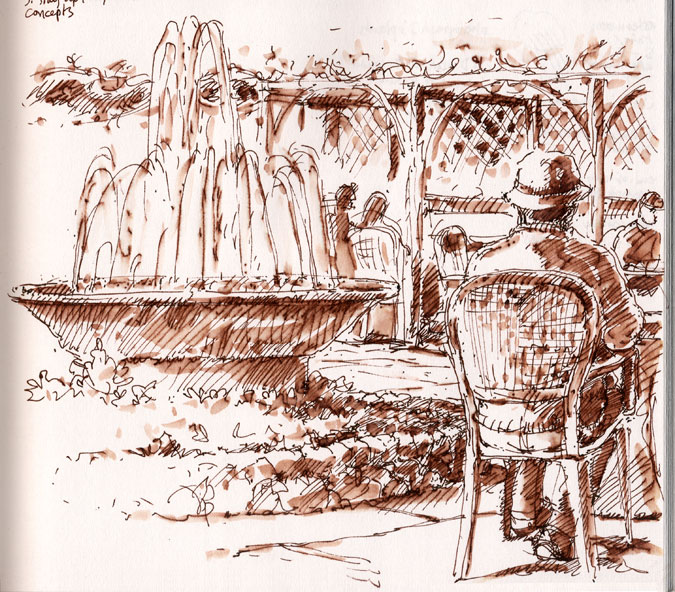 Drops
in rain language
have not yet begun to stutter
in the cloud throat.
The thunder mouth is toothless
and lighting has not yet flicked
the spotlights on in the pupil
of the eye.
Until the stoves are lit,
sleeves will be rolled up on the arms of the sun,
another demonstration will erupt
in the clandestine curves of the girl
who in a Trieste piazza has wet
her lips with wine
and the summer will send gangsters
to repulse autumn’s gunmen
from the border of its waves.
—Ronny Someck
Drops
in rain language
have not yet begun to stutter
in the cloud throat.
The thunder mouth is toothless
and lighting has not yet flicked
the spotlights on in the pupil
of the eye.
Until the stoves are lit,
sleeves will be rolled up on the arms of the sun,
another demonstration will erupt
in the clandestine curves of the girl
who in a Trieste piazza has wet
her lips with wine
and the summer will send gangsters
to repulse autumn’s gunmen
from the border of its waves.
—Ronny Someck
Sparklers
This year, the evening of August 12th is the peak viewing time for the Perseid meteor shower. Congratulations, you lucky folk who happen to be in the mountains, on the prairie, at the beach, or in any location far from city lights! Set your alarm clock for midnight (if you are not still awake at this time), spread a blanket outside, lie down facing the northeast, and watch for shooting stars. Unfortunately this year the Perseids coincide with the nearly-full moon (of August 13th), so you may miss the faint ones. But even lying under a big golden moon at midnight is a treat.
For a larger picture and a little more about the Perseid meteor shower, please see Night of the Shooting Stars.
Summer Sun
I appreciate our glowing orb as much as the next person. However, given this long dry spell and 100-degree temperatures, I think it’s time for Helios to take a little holiday.
Nevertheless, here is a tribute for the first of August.
Great is the sun, and wide he goes Through empty heaven with repose; And in the blue and glowing days More thick than rain he showers his rays. Though closer still the blinds we pull To keep the shady parlour cool, Yet he will find a chink or two To slip his golden fingers through. The dusty attic spider-clad He, through the keyhole, maketh glad; And through the broken edge of tiles Into the laddered hay-loft smiles. Meantime his golden face around He bares to all the garden ground, And sheds a warm and glittering look Among the ivy’s inmost nook. Above the hills, along the blue, Round the bright air with footing true, To please the child, to paint the rose, The gardener of the World, he goes.—Robert Louis Stevenson
The Longest Day
Today I plan to dress in yellow, carry freshly baked corn muffins from door to door, and oblige everyone in my family to step outside and leap over a big fat candle in lieu of a giant bonfire (which would be frowned upon by the city government) to bring us luck in the coming year. Yes! today is the solstice, and, in the northern hemisphere, the longest day of the year and the first day of summer. Make the most of your long lovely light evening, because starting tomorrow, the days will begin to grow shorter again. Happy Summer!![]()

